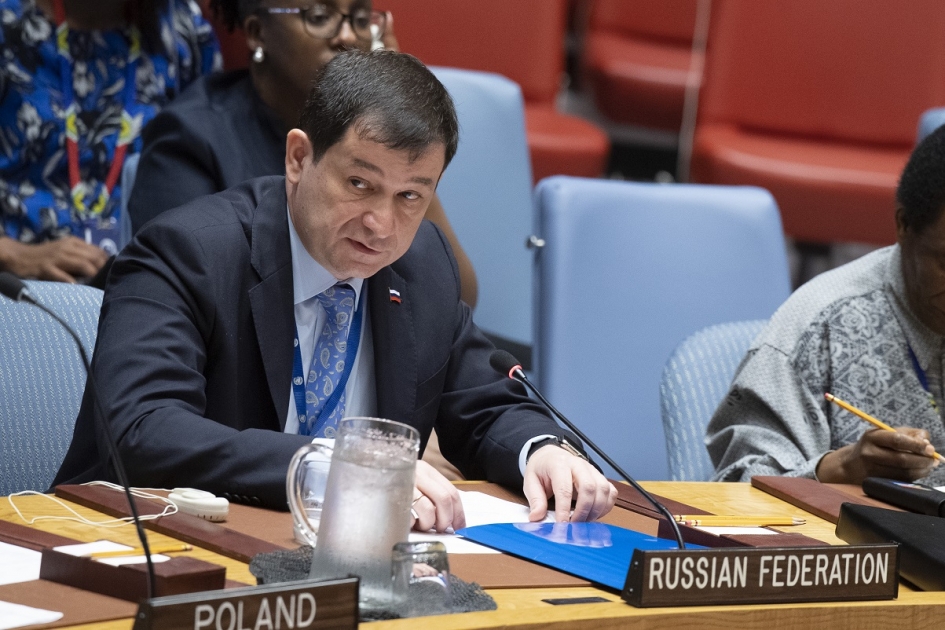Statement by Acting Permanent Representative Dmitry Polyanskiy at the Security Council open debate on the working methods of the UNSC
Mr. President,
At the outset let me express appreciation to the briefers: Ms. Karin Landgren and Mr. James Cockayne for their meaningful briefings.
We are thankful to the delegation of Kuwait for convening this open debate. For several years in a row, the Security Council has been discussing its working methods in an open format with participation of a broad number of UN Member States. We believe this is a useful practice, since a periodical review of our toolkit makes it possible to define resources for its further improvement.
An important issue is that our today’s debate is run under the presidency of a delegation that stands at the helm of the Security Council Informal Working Group on Documentation and Other Procedural Questions (IWG). We are convinced this discussion and the “external assessment” itself will contribute a lot to the activities of IWG and will help develop new ideas. However, it goes without saying, that all the working methods and any steps to modify them are the “property” of the Security Council.
The questions of UNSC working method are rather sensitive. We believe any alterations on this track should be aimed at increasing efficiency and responsiveness of the Security Council as it implements its main tasks of maintaining peace and security. Any populist rhetoric, including in the context of endless “enhancing of the level of transparency” of the Council’s work, both fails to help achieve the results and sometimes even impedes the process.
We welcome the efforts of Kuwait’s delegation to improve the UNSC working methods. We have taken notice of the intention to amend Note 507 by the President of the Security Council that is an important compendium of UNSC working practices which non-Permanent Member States often refer to as a vital primary source. On our part, we stand ready to assist the Kuwaiti delegation in this painstaking work. However, we proceed from the assumption that this should be done thoroughly and thoughtfully, without any excessive haste.
A good place to start would be to realize how important unity of Council's Member States is on the widest possible range of issues.
We point out active interest to procedural aspects of the Council’s activity coming from non-permanent Members. There is no doubt that it helps to collectively come up with best working practices for the Council.
Mr. President,
Once again we highlight that the Council’s document workflow is overburdened. The Council produces several hundred documents a year. Some of them, we must admit, have rather doubtful added value. We often come to see resolutions that go too deep into micromanagement. We are convinced that the Council’s “final products” should be brief, clear, easy to understand and, most importantly, action-oriented. Let me support our British colleagues at this point.
We have a reserved position towards the Security Council considering specific thematic episodes, particularly those that, as stipulated by the UN Charter, are part of the competence of the General Assembly, ECOSOC and other UN bodies. This violates the established “division of labor” and distracts the Council from addressing its primary tasks, where it can and should make concrete decisions.
We support the idea that the Security Council should enhance coordination with a wide range of Member States, and with those who can provide information that might be crucial for the decision-making. The UNSC toolkit has specific instruments to achieve this, including interactive dialogues and informal “Arria Formula” meetings. At the same time, those formats are not considered official meetings of the Council. We believe such formats should be used only to raise the Council’s awareness about the items on its agenda. It is unacceptable for delegations to use these platforms to hold propaganda shows, promote controversial unilateral approaches. Let me say that all expenses related to using the UNHQ, conference services and – in some cases – interpretation at such events are covered from the UN regular budget.
We should pay close attention to the proposals of the Kuwaiti Presidency on ways to modernize and democratize the work of the Security Council in the context of even distribution of penholdership. No Council Members should view countries or entire regions as their “estate” and act as sponsors of some given issues. The range of penholders should be extended, owing to non-permanent Members in the first place.
We would like also to speak up against the practice of working while in constant time trouble, which is created artificially. It is no secret that the adoption dates for the majority of resolutions become known at the stage when agenda for upcoming month is adopted. However, we receive many draft resolutions too late, which does not let us hold a multi-faceted expert study of them, to say nothing of holding full-fledged consultations. Sometimes we have an impression that penholders do it deliberately, assuming that while in haste, colleagues would fail to notice some problematic spots in drafts. Sometimes language of draft resolutions is changed several minutes before the vote. As a result, we have “raw” documents that do not account for concerns of Member States.
We proceed from the assumption that this is unacceptable. We will do our best to counter such tactical catches. Probably at some point we will have to evaluate efficiency of penholders based on the aforementioned criteria.
Thank you.
